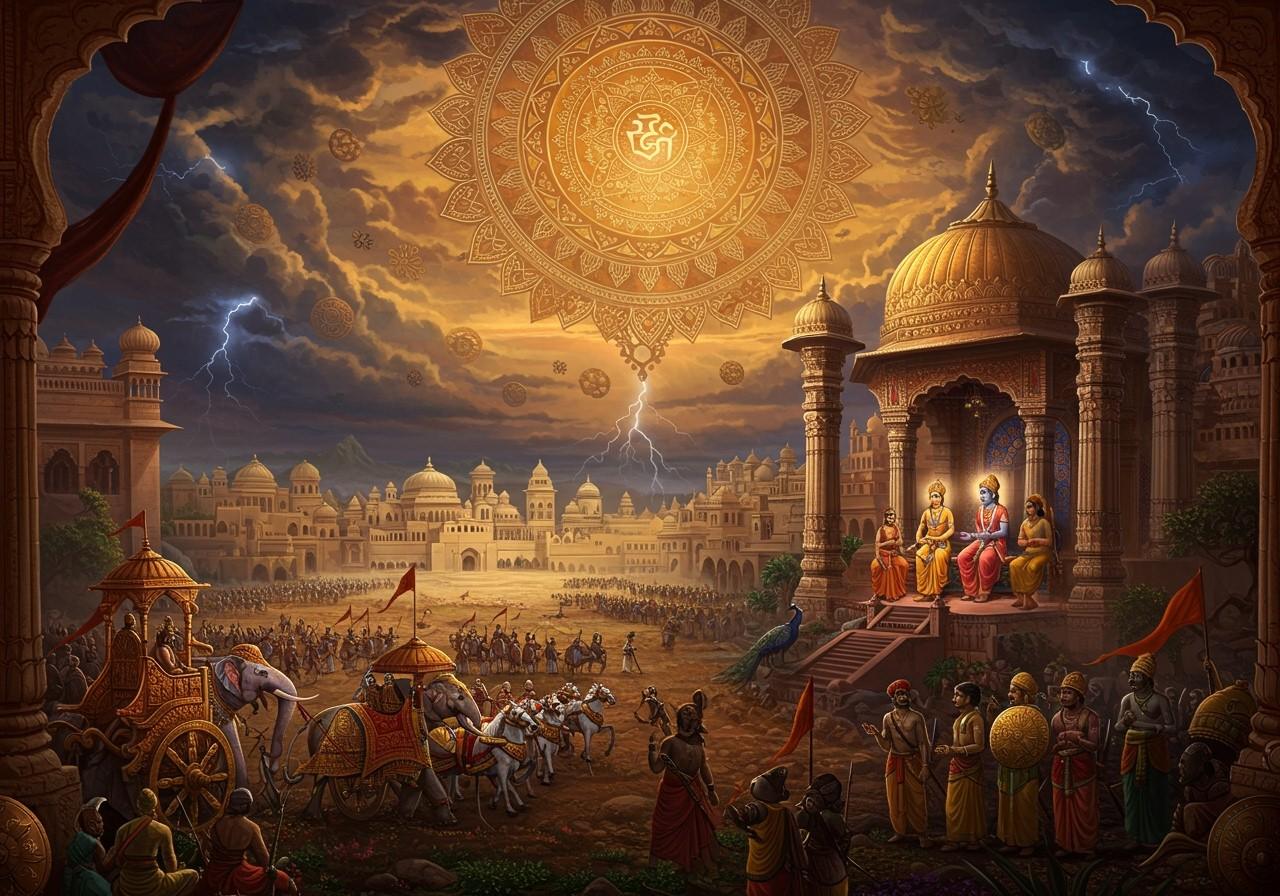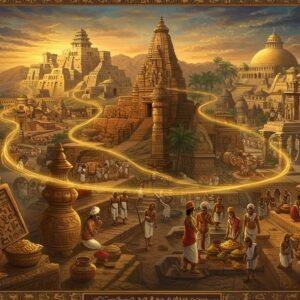
The Kuru Kingdom, a powerful dynasty in ancient India, significantly influenced the nation’s cultural and political landscape. This article explores the kingdom’s history, significance, and impact on dharma (duty, moral law) and warfare, examining the Mahabharata, the Kurukshetra War, and the dynasty’s contributions to Indian history.
Origins and Historical Context
The Kuru Kingdom originated in northern India, around present-day Haryana and Delhi. A dominant force during the Vedic period, the kingdom, founded by King Kuru, had its capital at Kurukshetra. Ancient texts like the Vedas, Mahabharata, and Puranas extensively reference the Kuru Kingdom, renowned for its adherence to dharma and promotion of Vedic culture and rituals.
The Kuru Dynasty
The Kuru dynasty boasted prominent figures like King Shantanu, Bhishma, and the Pandavas. King Shantanu, known for his wisdom and just rule, fathered Bhishma, famed for his unwavering commitment to dharma. The Pandavas played a central role in the Mahabharata and the Kurukshetra War. The intricate family relationships within the dynasty significantly shaped the events leading up to the war.
Dharma’s Influence
Dharma, encompassing duty, righteousness, and moral law, was deeply ingrained in the Kuru Kingdom’s governance and society. It guided the actions of Kuru rulers, and the Mahabharata extensively explores dharma’s role in maintaining social order and justice. King Shantanu and Bhishma exemplified dharma, becoming influential figures for future generations. The Kuru Kingdom’s emphasis on dharma significantly shaped ethical principles in ancient Indian society.
Warfare and the Kurukshetra War
The Kurukshetra War, a pivotal conflict in the Mahabharata, raged for 18 days between the Pandavas and the Kauravas, both branches of the Kuru dynasty. More than a physical battle, it represented a moral struggle, with dharma at its core. Figures like Arjuna and Bhishma displayed remarkable strategic prowess and bravery. The war profoundly impacted the Kuru Kingdom and ancient Indian history, symbolizing the eternal conflict between good and evil. According to research, attempts have been made to date the war to around 1000 BCE, although its historical accuracy remains debated.
Cultural and Religious Contributions
The Kuru Kingdom served as a bastion of Vedic culture, with rulers actively promoting rituals that preserved ancient traditions, ensuring their transmission through generations. The Mahabharata, intrinsically linked to the Kuru dynasty, profoundly influenced Indian literature. More than just a narrative, it’s a philosophical and moral treatise, its emphasis on dharma shaping ethical thought within Hinduism. Even today, the epic continues to inspire interpretations of duty and morality. King Shantanu and Bhishma, embodying dharma through their lives, demonstrated how righteousness guides actions and decisions, becoming role models for future generations and influencing the development of moral principles in ancient Indian society.
Legacy and Influence
The Kuru Kingdom’s legacy transcends its historical boundaries. Its principles of dharma and the lessons from the Kurukshetra War influenced subsequent dynasties, establishing standards of duty and righteousness for future rulers. The 18-day Kurukshetra War, as narrated by Sanjaya to King Dhritarashtra in the Mahabharata, symbolizes the fight between good and evil, offering profound lessons on virtues and righteousness. Fought in Kurukshetra, currently in Haryana state, the war’s legacy endures. Figures like Arjuna and Bhishma, renowned for their strategy and valor, continue to inspire. The Kuru dynasty’s contributions to Vedic culture are undeniable, with their rituals preserving traditions and their emphasis on dharma shaping Hindu ethics. Today, the kingdom’s legacy persists through ancient texts, reminding us of the importance of duty and moral law. The Kurukshetra War’s lessons resonate even now, shaping modern understandings of dharma and warfare. The Kuru kingdom promoted Vedic rituals and preserved Hindu traditions which are still valued today.
Honoring the Kuru Legacy with Sacred Rituals
At Poojn.in, we offer essential items for performing rituals that connect you with the Kuru dynasty’s spiritual heritage. Our curated collection includes:
- Pure copper and brass utensils for water offerings (achaman), reminiscent of those used in ancient Hastinapur. These high-quality utensils enhance the sanctity of your rituals.
- Traditional kusha grass and dharba grass mats for meditation and ritual practices. These natural mats provide a grounding and pure space for your spiritual activities.
- High-quality ghee (clarified butter) for sacred fire ceremonies (havan). Our pure ghee ensures the authenticity and positive energy of your havans.
- Complete havan samagri kits with natural ingredients. Our kits simplify the process of performing havans, providing all the necessary components in one convenient package.
- Authentic rudraksha malas and sacred threads for spiritual practices. These powerful tools aid in meditation and enhance your connection to the divine.
Poojn.in prioritizes authenticity and quality. Our products meet stringent standards and are sourced responsibly. Our online platform offers convenient access to these traditional items, securely packaged and delivered across India.
FAQs
What is the Kuru Kingdom? The Kuru Kingdom was a significant kingdom in ancient India, renowned for its role in the Mahabharata and its rich cultural heritage centered around dharma.
Where was it located? The kingdom was situated in northern India, primarily in the region around modern-day Haryana and Delhi.
Who were its prominent rulers? Key figures include King Shantanu, Bhishma, and King Dhritarashtra, who played a crucial role during the Mahabharata.
What is the significance of dharma in the Kuru Kingdom? Dharma, meaning duty or righteousness, was paramount. Rulers and warriors adhered to its principles, as depicted in the Mahabharata.
What is the Kuru Kingdom’s connection to the Mahabharata? The kingdom is deeply intertwined with the Mahabharata. Its rulers and their descendants are central characters in the epic, which narrates their struggles and conflicts.
Why is the Kuru Kingdom important? The Kuru Kingdom is crucial to ancient Indian history for laying the groundwork for later empires and influencing cultural and ethical practices through its adherence to dharma and the lessons of the Mahabharata.


